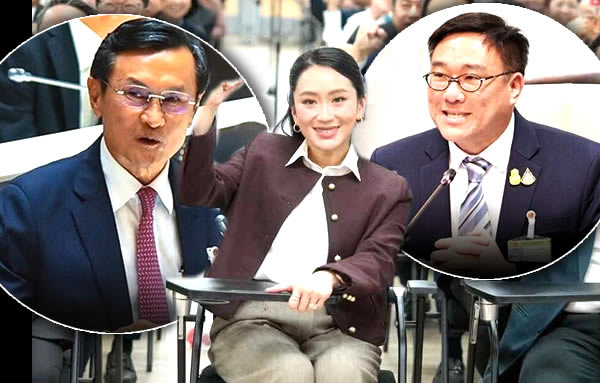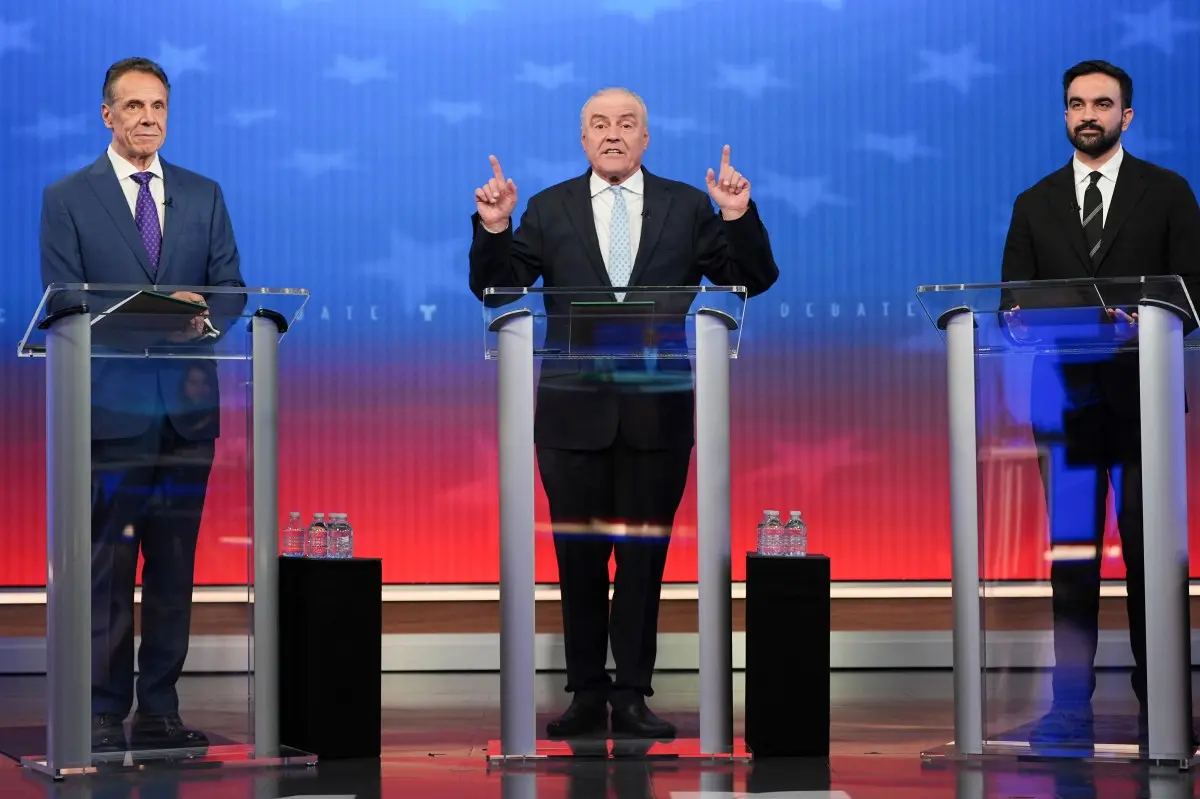Copyright thaiexaminer

Pheu Thai faces a high-stakes leadership showdown on October 31 as Chaturon Chaisaeng and Julapun Amornvivat battle for the top post, while veteran Suriya Jungrungruangkit is the focus of factional tensions and denies rumours he could take 70 MPs with him. The Pheu Thai Party faces a tense leadership battle, with Chaturon Chaisaeng leading the pack, closely followed by Julapun Amornvivat, the former Deputy Minister of Finance. The winner will be decided at a crucial meeting on Friday, October 31. Tensions are rising as factionalism spreads within the party, centred on veteran former Deputy Prime Minister Suriya Jungrungruangkit, who is reportedly backing his nephew, Pongkawin Jungrungruangkit, for the top post. On Wednesday, rumours surfaced that Mr. Suriya might quit the party and take 70 MPs with him—claims he has vehemently denied. The resignation of former Prime Minister Paetongtarn Shinawatra as Pheu Thai Party leader on Wednesday stunned observers across Thailand. Many analysts say it reflects the logical aftermath of her removal in August by the Constitutional Court. Meanwhile, others argue it signals a factional betrayal within the party, with insiders claiming the so-called “girlfriend-and-family” ladder was effectively ousted. Despite stepping down, Ms. Paetongtarn has pledged full support for a new party leadership. Furthermore, political commentators agree the Shinawatra family’s influence within Pheu Thai will remain strong. She is expected to continue as an elder and guiding figure. Moreover, her resignation signals a strategic attempt to allow the party to modernise and prepare for the upcoming elections. Key candidates emerge as factional tensions grow over leadership succession in the Pheu Thai Party Already, key candidates have emerged for the October 31st leadership showdown. Among them is Chaturon Chaisaeng, a former Deputy Prime Minister, celebrated for his pro-democracy stance. Likewise, Julapun Amornvivat, former Deputy Minister of Finance and Chiang Mai MP, is widely recognised. Notably, Mr. Julapun enjoys deep loyalty to Ms. Paetongtarn and strong connections to the party’s younger grassroots members. Analysts suggest his candidacy reflects a generational shift within Pheu Thai. Meanwhile, speculation is growing around senior Pheu Thai operator Suriya Jungrungruangkit. Reports suggest he is backing his nephew, Pongkawin Jungrungruangkit, for party leadership. However, Mr. Suriya strongly denies such claims. In addition, rumours suggest that if he loses a power struggle, he could take up to 70 MPs with him. Party insiders dismiss these claims as exaggerated, yet the speculation underscores internal tensions. Following Ms. Paetongtarn’s resignation, Mr. Suriya labelled rumours about forcing her out as “baseless” and defamatory. He further stated he would pursue full legal action against those spreading false information. Mr. Suriya, a veteran of the Thai Rak Thai era, is well-known for his alliance with Somsak Thepsutin. Both men have reputations for aligning with whichever side holds power. Therefore, observers are closely watching Mr. Suriya’s next moves. Pheu Thai MPs focus on Chaturon and Julapun as frontrunners in upcoming party vote Pheu Thai MPs have already identified Chaturon and Julapun Amornvivat as the most prominent leadership contenders. However, the party has not yet formally discussed the nomination process. Reporters confirmed that the executive committee has scheduled an October 31st general meeting to elect the new party leader. Until then, acting leader Chusak Sirinil will oversee party operations. On October 22, 2025, Ms. Paetongtarn issued a statement outlining her resignation. She told party members and supporters: “I have decided to resign as Pheu Thai Party leader to begin a full party overhaul.” She emphasised that Thailand faces a complex, sensitive, and unpredictable global environment. Moreover, she argued that the party must modernise, restructure, and revitalise itself to succeed in the upcoming elections. Ms. Paetongtarn highlighted that her resignation is intended to ensure the party can independently rebuild its structure and strategy. She said she would remain a party member and head of the Pheu Thai family. “I will work alongside all members to create a party that serves the people and strengthens the country,” she added. Her comments underline both continuity and change, signalling that her influence remains critical. Executive committee and party MPs receive resignation and emphasise continuity while preparing for elections The Pheu Thai Party executive committee and MPs gathered immediately to receive her announcement. Ms. Paetongtarn entered the meeting smiling, greeting media personnel, and engaging party leaders. Sorawong Thienthong, acting secretary-general, explained that her resignation aligns with the party’s goal of transformation. He emphasised that the party is preparing for future elections, ensuring continuity while promoting reform. When asked about her resignation’s motivation, Mr. Sorawong cited the Constitutional Court’s removal of Ms. Paetongtarn on ethics grounds. He added that the decision prevented potential political intimidation of MPs and candidates. Furthermore, it protects the party from internal disruption during recruitment and election campaigns. He concluded that her resignation preserves unity while allowing Pheu Thai to restructure effectively. MPs reassured over party stability while Suriya addresses false claims and threatens legal action Mr. Sorawong also addressed concerns that MPs might leave the party following her resignation. He said loyal members will stay, while those whose commitment has waned will depart peacefully. “Politics depends on ideology and intention,” he said, stressing mutual respect. Additionally, he noted that the selection committee is actively interviewing potential candidates daily, reinforcing a structured and democratic process. Suriya Jungrungruangkit addressed a controversial Facebook post by political activist Taikorn Pholsuwan. The post claimed the Jung family forced Ms. Paetongtarn to resign, threatening to take 70 MPs to a new party. Mr. Suriya condemned the post as false and damaging to both himself and his nephew, former minister Pongkawin Jungrungruangkit. Furthermore, he announced legal action for criminal defamation. Mr. Suriya detailed his political career, noting he joined the Thai Rak Thai Party under former Prime Minister Thaksin Shinawatra. Later, he served as deputy prime minister and transport minister under Ms. Paetongtarn. He insisted that claims of forcing her resignation were impossible and defamatory. “We will continue recruiting members to maintain our 200-MP target,” he added, highlighting a strategic focus on party strength and stability. Suriya denies leadership ambitions while stressing the need for new generation leaders in Pheu Thai He also denied rumours that he sought the party leadership. Instead, he emphasised the need to bring in new-generation leaders unconnected to the Shinawatra family. “We must support the next leader, whoever is chosen,” he said. Additionally, he stressed that the Shinawatra family’s legacy remains central to the party, citing Thaksin’s economic recovery programs and universal healthcare initiatives. Ms. Yingluck Shinawatra’s tenure as Prime Minister also demonstrated the family’s contributions, despite political setbacks, including coups. Mr. Suriya stressed that while the party plans to appoint a non-Shinawatra leader, historical contributions cannot be ignored. Furthermore, he underlined the balance between continuity, reform, and generational renewal as essential for the party’s success. Following her resignation, the executive committee stepped aside, with Chusak Sirinil appointed acting leader. The committee will manage party operations until the October 31st leadership election. This vote is expected to define the Pheu Thai Party’s strategic direction. Observers note that the outcome could significantly influence Thailand’s political landscape ahead of the next elections. Competition between established leaders and new generation figures could shape party strategy While the party has not formally finalised nominations, Chaturon and Julapun remain the frontrunners. Chaturon is widely respected for his democratic credentials and experience in government. Meanwhile, Julapun is seen as a rising new-generation leader capable of engaging younger voters and grassroots networks. Analysts suggest that the competition between established experience and new perspectives could shape the party’s electoral appeal. Political commentators argue that Ms. Paetongtarn’s resignation reflects both strategy and selflessness. By stepping aside, she allows the party to modernise without abandoning its historic ties to the Shinawatra family. Moreover, her continued role as an elder ensures that institutional knowledge remains within the party’s decision-making process. Observers note that internal factions are actively negotiating alliances. Suriya’s influence, while officially denied in leadership contests, continues to shape internal dynamics. Meanwhile, Chaturon and Julapun must navigate party expectations, historical loyalties, and generational aspirations. The leadership contest is expected to test both the cohesion and adaptability of the Pheu Thai Party. Pheu Thai party faces crucial crossroads as leadership vote could redefine Thailand’s political landscape The Pheu Thai Party is now at a crossroads. On one hand, it seeks generational renewal and reform. On the other hand, it must preserve ties to the Shinawatra family and maintain grassroots support. Analysts say the October 31st leadership election will be pivotal in determining the party’s electoral competitiveness. Additionally, it could influence the broader political equilibrium in Thailand for years to come. Observers expect high-stakes negotiations in the coming days. MPs and party officials are meeting daily to assess candidates, discuss strategies, and ensure a smooth transition. Legal frameworks and party procedures are being reinforced to prevent disputes. Furthermore, maintaining public confidence is critical, as the party prepares to face voters in national elections. The resignation of Ms. Paetongtarn Shinawatra, the strategic role of Mr. Suriya, and the rise of Chaturon and Julapun highlight the evolving nature of the Pheu Thai Party. The party is striving to balance continuity, legacy, and reform. Unity, grassroots mobilisation, and leadership renewal will be key to Pheu Thai’s electoral success As the party moves forward, attention is also focused on maintaining unity. MPs emphasise the importance of internal cohesion while embracing leadership renewal. Analysts note that the party’s ability to mobilise grassroots support, present a coherent platform, and engage voters will be decisive in upcoming elections. Meanwhile, Ms. Paetongtarn’s presence ensures continuity, providing reassurance to party members and supporters. Former Pheu Thai leader welcomes return of Ex Democrat Party PM Abhisit back to frontline politics Pheu Thai revitalised as support for the People’s Party falls due to its shock support for Anutin as PM Political experts assert that Pheu Thai is entering a period of high-stakes transformation. The leadership contest will test the party’s resilience, adaptability, and strategic vision. Furthermore, the internal dynamics between old-guard figures, emerging leaders, and influential operators like Mr. Suriya must be closely monitored. Ultimately, the outcome will reflect how the party balances its historic legacy with the demands of modern Thai politics. One false move or a lurch into unknown territory could destroy a vast political legacy. On the other hand, the right decision on Friday, October 31st, could catapult Pheu Thai back to power. Join the Thai News forum, follow Thai Examiner on Facebook here Receive all our stories as they come out on Telegram here Follow Thai Examiner here Further reading



